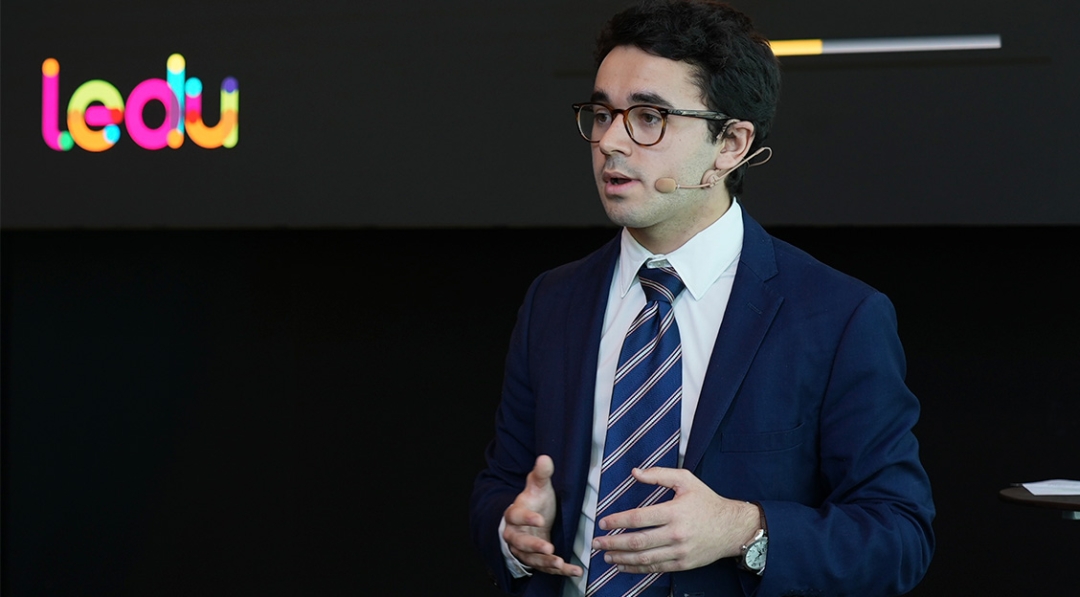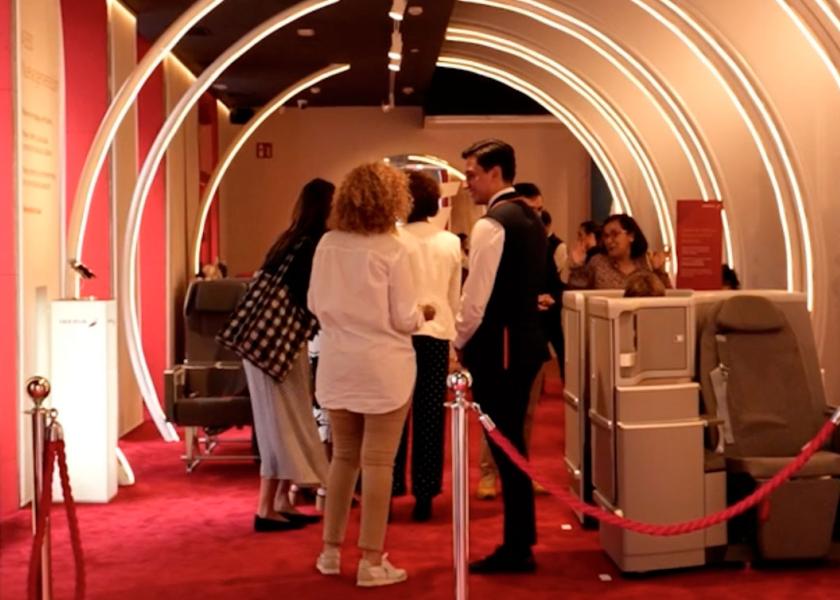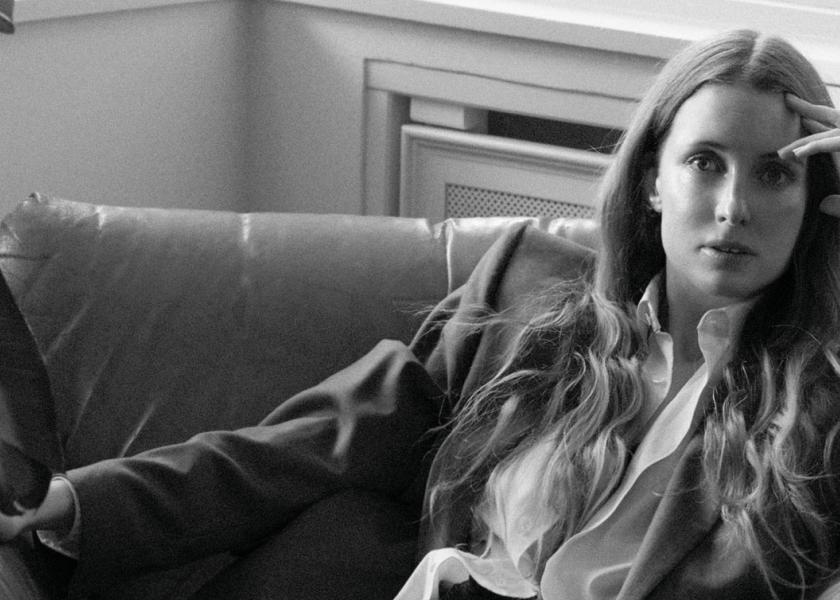Tomás Aparicio
A man of his word

With the prestige of being renowned and the excitement of being a contender. This is the letter of introduction of Tomás Aparicio, debater and student at the University of Vigo, at the World Universities Debating Championship in Spanish. Two intense years on the Spanish debate circuit have turned him into one of the leading candidates to win the championship. His key to success? Never giving up. [Tomás Aparicio was proclaimed World Debating Champion. Updated: 12/10/2023].
Smiling and calm. Excited to talk. To share his love for public speaking and his discipline: debating. This is how Tomás Aparicio (Vigo, 2001), a renowned debater who aspires to winning the World Universities Debating Championship in Spanish final, an event sponsored by Iberia which takes place on 11th October, seems during our conversation. After just two years on the debating circuit, he has already won most of the most renowned awards and stands out for coming second in the Spanish University Debate League (LEDU). An intense career that cannot be explained without delving into the root of his talent and ambition: being a man of his word and never giving up. [In the final of the World Debating Championship in Spanish, Tomás Aparicio beat Argentina's Leandro Flores, from the University of Tucumán, after a debate on a topical issue: will we be able to distinguish real news from fake news after the advent of AI? Updated: 12/10/2023].
Every story has a beginning. Where does your passion for debating come from?
At home, since an early age, we’ve always had on talk shows or election debates. That gave me an itch for communication and public speaking, but it wasn’t until I went to university, joined a debating society, and started going to tournaments that I realised that there’s more to debating than what we see on television, there are other ways of debating and speaking in public.
If you were speaking to someone who has no idea what debating and public speaking is, how would you explain it to them?
Debating is a way of applying public speaking. Debating consists of convincing someone about certain topics by reasoning in an orderly fashion around a particular idea. Generally, a question is raised, and teams made up of four people, taking a stance both for and against, must prepare reasons and arguments that are, on the one hand, good and original content and, on the other, an understandable and convincing message.
“It’s essential to measure your words and the information included in a message and how it is conveyed. Less is more”
To succeed at debating, do you need to be a know-it-all?
Debating is based on learning critically; the more knowledge you have, the better, but knowing a lot about a certain topic is useless if you don’t know how to convey that information. It’s essential to measure your words and the information included in a message and how it is conveyed. Less is more.
How different is debating in competition from debating in the street?
When you’re at a competition it’s different because the jury is impartial, but for people on the street, who don’t question the logic, premise or causal link behind an argument, the key is to empathise with the other person and know how to put yourself in their shoes. When we experience other people’s feelings, we’re more aware of why they think that.
Words are both simple and complex. Where does their power lie?
The power of words lies in that they are able to cover different ideas and convey them in a way that is understandable for everyone. They are a vehicle for conveying ideas. And these can be really rational and logical things —like explaining the theorem behind a mathematical formula, for example— or others that aren’t so rational, like feelings.

Tomás Aparicio has been in the world of debate for two years and is already one of the references in the discipline. © Diego Andrés Balsa
The current champion, Leonel Caschetto, told us that “we’re emotional beings” and that “our decision-taking is influenced by the emotions we feel.” Do you agree?
Absolutely. The virtue of a good public speaker is to make a complex idea easily understood and that’s where the emotional side, using any resource, is important. It’s true that in a debate, rational, logic and coherence should beat irrationality, but the emotional side helps.
“The key is to empathise with the other person and know how to put yourself in their shoes. When we experience other people’s feelings, we understand better what they think”
Which are the main communication tools a debater uses to convince their audience?
At the beginning of the debate, you can use a preamble, which is “an introduction to a speech or piece of writing.” It captures the other person’s attention and can win them over, so they better absorb the content you’re going to convey. In terms of developing the argument, it’s essential for the order of ideas to be easily understood and for data to be tangible, by contextualising and comparing them to things we can relate to in our everyday lives. And at the end of a speech, we must recap the original idea, because that makes it homogeneous and cohesive. More generally, there must be non-verbal communication throughout the entire process: looking people in the eye, smiling, moving your hands and feet. These are more intuitive things, but you also need to practice them.
The concept of talent seems immeasurable, but, given that words have the power to narrow it down, tell me what it means to you.
Talent is a natural predisposition we have for something. In any case, it’s 1% of what one is capable of doing. A year ago, nobody knew who I was, I’ve lost more tournaments and debates than I’ve won (laughs), but the key is not giving up, observing the people who do things well and try to learn from them. For things to work out talent helps, but it’s not the be all and end all.
In your opinion, which three talents must an expert public speaker have?
In the context of public speaking, I’d say there are three types of talent: the ability to connect words and turn elaborate ideas into simple messages; emotional intelligence, which means knowing how to put yourself in another person’s shoes; and ease, how you communicate and move.
“We have a really rich language, which we share with hundreds of millions of people around the world and that enriches us as a community”
In a few days you’ll take part in the World Universities Debating Championship in Spanish... Which are your expectations for that main event? Can you see yourself winning the title?
I’ve only been part of the world of debating for two years, but they have been emotionally intense. During my first year, things didn’t go according to plan. Nevertheless, my colleagues gave me the chance to go to LEDU and, a lot has happened since that tournament, so it’d be a nice way of coming full circle. I’m going to try my best!
The World Universities Debating Championship in Spanish celebrates the diversity of the Spanish language, among other things. Is it a privilege to speak it?
We have a really rich language, not only because of its huge historical tradition, but also because we share it with hundreds of millions of people around the world... We have so many words and expressions that, depending on the country you’re in, mean one thing or another, and even sound different. It enriches us as a community.


